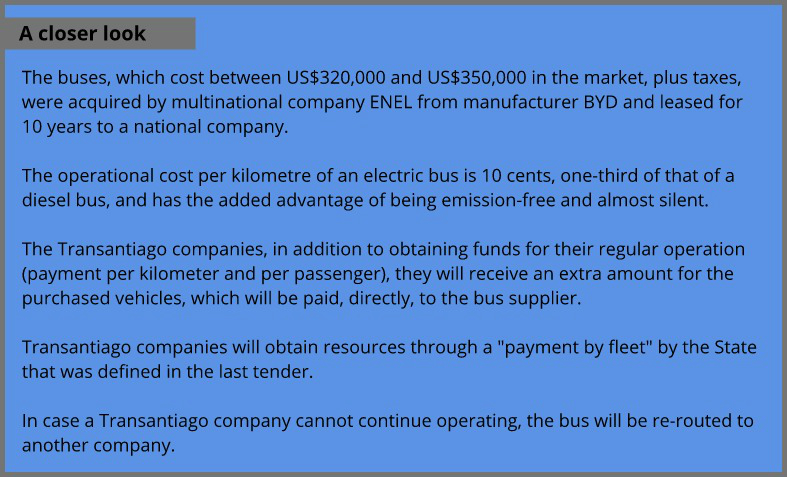A few drivers on Chile’s Route 78 last month may have been treated to the sight of a long, red-and-white road train of buses humming quietly along the highway.
They were Chile’s first 100 brand new electric buses, rolling their way from the Port of San Antonio to their new home in Santiago.
While the new e-buses comprise just 1.5 per cent of the 6,600-strong bus fleet circulating in the capital city, they are part of a bigger plan that would see a public transport system powered 100 per cent by electricity by 2040– a target brought forward 10 years at the UN Climate Change Conference last week.
Chile expects to welcome another 100 electric buses next year.
The e-bus deliveries coincide with scheduled fleet renewals, replacing retiring buses, and so are financed within the current budget.
Each 12-metre-long bus carries 80 people, charges in three hours and has a range of 250 kilometres per charge.
According to the Ministry of Transport, around 18 million daily trips are made in the metropolitan region of Santiago, of which 30 per cent are taken by public transport, 31 per cent by private transport and 5 per cent by bicycle.
Transport is the top source of fine particulate matter (PM2.5— or particles the size of viruses) pollution in Chile’s cities, and the second largest source of greenhouse gas emissions, after electricity generation.
Santiago, the very first BreatheLife city, is bowl-shaped, ringed by mountain peaks, a geography that traps air pollutants and results in bad air quality, particularly in the winter.
In 1995, World Bank research found that the cost of healthcare for pollution-related illnesses in Santiago was greater than what it would cost to clean up the pollution in the city.
The city has since found itself at the forefront of policymaking for air quality in the region, adopting cleaner urban transport, emission controls on cars and factories and cleaner gases and energy sources, promoting cycling, and aggressively investing in better buildings— and it’s all been paying off.

Read more here: Parte renovación del Transporte Público de Santiago: arriban a Chile los primeros 100 buses eléctricos
Read more on electric mobility and development from the World Bank here: Electric Mobility and Development : An Engagement Paper from the World Bank and the International Association of Public Transport
BreatheLife Webinar Series para América Latina y el Caribe
Sesión 2: Electromovilidad
Jue., 20 de Dic. de 2018
09:00 am CST (Mexico), 10:00 am EST (Colombia, Panama, Peru), 12:00 m GMT-3 (Argentina, Chile)
Nos complace invitarles a la segunda sesión de las serie de webinars de la Campaña Respira Vida, para intercambio de experiencias y fortalecimiento de capacidades en las ciudades/países/regiones de América Latina y el Caribe.
En este segundo webinar de la serie se presentarán experiencias para la efectiva implementación de vehículos eléctricos en el transporte público en América Latina. Santiago de Chile, quien recientemente anunció su meta de 40% de vehículos eléctricos para el año 2050 compartirá su experiencia en el desarrollo de las políticas de promoción de electromovilidad, el desarrollo de infraestructura de carga eléctrica y la implementación en Transantiago. Contaremos con la participación de Cristina Victoriano del Ministerio de Energía de Chile y Pablo Salgado del Ministerio de Transporte y Telecomunicaciones quienes discutiran los avances de Chile en la materia. Asimismo, Ray Minjarres del ICCT presentará una perspectiva de los avances internacionales en la materia desde las iniciativas de la CCAC.
La serie de webinars de la Campaña Respira Vida para América Latina es un esfuerzo conjunto de la Organización Panamericana de la Salud (PAHO), el Programa de las Naciones Unidas para el Medio Ambiente (UNEP), la Coalición Clima y Aire Limpio para Reducir los Contaminantes de Vida Corta (CCAC) y el Clean Air Institute.
Banner photo by Enel Chile.
